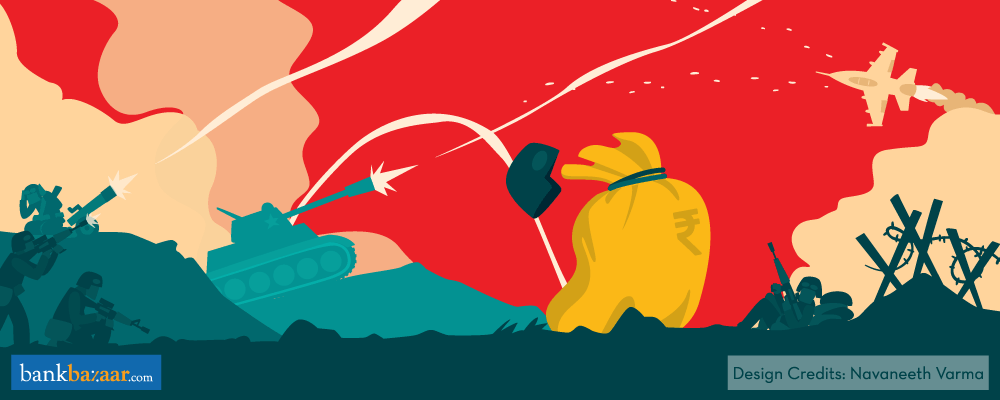
From bombings in Syria and Iraq to the diplomatic crisis revolving around the South China Sea, the political scenario across the world is looming with uncertainties. The growing tension is becoming increasingly threatening for investors in terms of building an Investment portfolio as markets have always taken a hit in the face of big political crises. So, with the change in threat perception from time to time, investors need to reassess their investment allocations.
India and Pakistan, too, have been having a go at each other, with border skirmishes claiming lives on both sides. India’s recent retaliation for the attacks on Uri led to the Sensex dropping 5% in a day. Investors cannot rule out the chances of a more damaging fallout, which could take the markets down along with it.
In situations like these, it is important to re-orient asset allocations in advance in order to tackle such adversity.
How war impacts investments
War drains the resources of a nation. Prices of products typically go up after war due to the fear of a shortage of supply in the market, which in turn causes inflation in the economy even if the actual demand and supply do not significantly change.
The value of domestic currency falls largely due to withdrawal in foreign investments, as well as institutional investors refraining from investing in stocks since they consider doing so unsafe.
Investment products such as stocks, Mutual Funds and corporate debt instruments are typically replaced by government bonds, precious metals and Small Savings Schemes in a market with uncertainty. People even want to hoard cash to use during an emergency. The sell-off of assets can cause the stock market to depreciate.
If war starts, it may continue for days or months. The longer it continues the more damage it causes to the economy.
So, we suggest you make your portfolio bulletproof as early as possible. Even if a war doesn’t break out immediately, you should be prepared with the right investment instruments.
Restructuring investment assets
You must revisit your existing investment portfolio the moment you sense turmoil. In a time like this you have to protect what you have. Your portfolio must reflect reduced exposure to the stock market because the foreign institutional investors are likely to withdraw funds aggressively as soon as they realise the grimness of the situation. Do not hold positions in corporate bonds because the companies fail to predict their future earnings and mostly stumble in achieving regular growth, facing the risk of default. Also, do not keep large amounts of cash on hand because the value of domestic currency may erode at an unexpectedly fast pace.
Which are the safer assets?
Precious metals such as Gold is a safe haven in times of crisis. The yellow metal is a tested asset under war-like situations, and the best hedge against inflation. Once a war starts and the value of the domestic currency depreciates against other currencies, gold rates continue in its position. We suggest you start focusing on gold slowly before its price shoots up as more and more investors rush in to buy it after predicting the proximity of war.
Government securities and small savings schemes are other instruments which are considered safe during the time of war, as they have government backing and are adequately liquid in nature to meet your requirements in case of an emergency. Schemes like Kishan Vikas Patra and National Savings Certificate (NSC) are some options that could come handy. You can continue saving on a monthly basis through such instruments in order to stay invested regularly.
Once war is declared, the stock market will become volatile, so you can slowly invest in shares which will remain fundamentally strong in the long run. Stocks related to consumer goods and oil refinery companies usually perform better during uncertainty. It’s also a good time to start investing fresh in large-cap equity funds for the long term.
Do not overestimate returns
Investors who overestimate returns at times like this often end up losing money. We suggest you book profit on regular intervals, considering the volatility of the market. Set a time frame for your returns in advance, and once you receive profit as per expectations, do not let your temptations overpower your financial planning.
Uncertainty in the economy often leads to unpredictability and ambiguity in the investment market, so we recommend prioritizing on keeping your money safe.
Additional Reading: How Important Is A Well-Diversified Portfolio?
While we recommend refraining from ambitious moves at times of geo-political crisis, it is always smart to continue to protect what you have. Revisiting and re-assessing your portfolio at regular intervals will help you re-allocate your investment assets in accordance with the market movements.